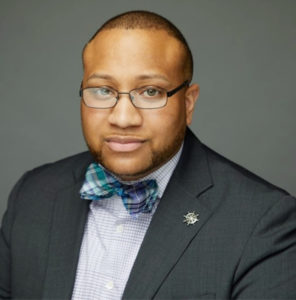Legal Freedom Fighter Series: Daris B. Jackson

We’ve seen it repeatedly throughout our history: When people’s rights are threatened, it’s the lawyers who step up to the plate. Some are true Freedom Fighters, and they deserve special recognition. That’s why each month, we will feature lawyers who are really making a difference.
Today, we are proud to feature Daris B. Jackson.

Daris B. Jackson is the principal attorney at The Law Office of Daris B. Jackson, a virtually run solo practice specializing in Criminal Defense, Special Education Litigation, Family Law, and Estate Planning. Daris founded his firm to help provide affordable high-quality legal solutions to communities and families that are facing legal road-blocks.
Daris has dedicated his professional and educational pursuits to fighting for the rights of marginalized communities. Whether helping victims of sexual assault and child abuse, special education students, or anyone in need, he seeks to find justice for his clients and help them find their voice. He also holds monthly panels at no cost to participants to provide them information on financial literacy and various educational resources. He is a true Freedom Fighter.
Here’s the interview:
What inspired you to become a lawyer?
The funny thing is, now that I am in solo practice, my clients (mostly my clients who are children) often ask me this question. Honestly, I never planned on becoming a lawyer. I have a BA in Sociology, and a MS in Urban Affairs, both from Hunter College. My background is in activism and helping folks who are marginalized find their voice. I always had a vision of myself as a lawmaker, and when I sat and really thought about the inequities that marginalized people face, I realized a lot of it rests on lawmakers, because many legislators are non-lawyers that have never litigated and have no idea how things happen at the most micro level. So, I decided that if my calling was to become a lawmaker, I needed to give myself the opportunity to be “at the frontline” as they say, experiencing how policy affects the micro level; and in my mind, the only socially responsible way to do that was to become a lawyer. I love practicing law because I am able to directly help people obtain justice—and I truly believe that justice looks differently for everyone.
What was your most memorable case?
The most memorable case I worked on was when I was a prosecutor in New York. I worked as a special victims prosecutor, handling mostly sexual assault and child sexual abuse cases. One particular victim was a disabled woman that was severely sexually assaulted in a hospital by a hospital staff member while she was recovering from surgery. The experience left her completely devastated, embarrassed, and afraid among other things. Particularly, she developed a significant distrust of men. In fact, at first she outright refused to work with me and asked to have another attorney assigned to handle her case. We met many times, and after a lot of work on both of our parts, we were able to develop a very trusting relationship. This process took months, but it was important to me to allow the process to happen organically. Ultimately, we were unable to secure a conviction in this matter. However, the victim pulled me aside when the verdict was read and thanked me for doing the work to help her regain her voice. It was probably the highest moment in my career as an attorney to date.
From an equal rights and racial justice perspective, where do we stand today?
We are at a very interesting point in history, but I suppose every point in history is interesting at the time. I find that while “rights” as we have come to know them over the past 20 years are quickly diminishing, we find ourselves in a situation where racial justice has heightened mobility. There is a lot of upset, outrage and anger, but there is a large disconnect in how the legal system is addressing these points of view. This extends to gender bias and disproportionality, sexual identity and one’s expression of same, religious freedoms, and how certain organized movements can use legal tactics to repress and reverse many of the gains marginalized people have made over the past two decades. While many “rights” exist, I am not certain that the infrastructure of our legal system is adequately equipped to continue to protect these gains. However, I find hope and encouragement of the resilience of those who continue to organize, teach, lead, and remain vocal and visible in the fight to maintain fairness in the justice system
What challenges do you face today that you never encountered before?
There seems to be a pattern of normalization when encountering episodes of gender bias, sexual identity bias, and bias against those who are affected by substance abuse, and those with a history of mental illness. In my previous practice areas, particularly in Criminal Prosecution, I found there was a more systematic approach to how these communities were engaged, and how legal service providers took a cooperative approach toward addressing the specific needs of these populations. However, now that I represent clients individually, as opposed to representing “the people” at large, I find that many of my colleagues feed in to the very negative tones that have become “normal” when addressing the needs of these clients. As an open LGBTQ attorney of color, that often represents special education students, I strongly lobby against any normalization of this type of conduct and I often find that I spend a lot of time educating my peers, and even members of the Bench, on how to better engage these litigants. I suppose it fits in with my background in activism and my commitment to fighting for the rights of marginalized groups in their push toward access to justice. This is very much a new experience for me, coming from a very diverse and tolerant practice area.
You’ve had so many successes. Which one (or ones) stands out the most for you?
The first would be serving as the class speaker when I graduated from the Rutgers School of Law, in Newark NJ. It is a very humbling experience to be selected by your peers to speak on behalf of a group of new lawyers, at arguably one of the most intimate moments of our collective lives. It was a huge honor, and I took it very seriously; I locked myself away on a prairie in Ontario, Canada, and tried to write a very moving and honest speech, that focused on all the wonderful things I watched my fellow classmates do for each other, and for society, and how I viewed them all as agents of socio-political change. Secondly, as I stated before, one of my goals in life is to affect policy in a socially responsible manner, starting at the margins on the most micro level. One of my most proud successes is being recognized as a community leader, and being appointed by Bronx Borough President Ruben Diaz to sit on Bronx Community Board 8, where I serve as Vice Chair of the Economic Development Committee, and as a member of the parks and recreation committee.
If you could give one piece of advice to other lawyers across the country, what would you say?
Do EVERYTHING you can to avoid burnout, by living the best, balanced life you can! I give this advice because I find that many of us, in our quest to “save the world,” often forget that we cannot do anything if we are in complete shambles! I try very hard to be as honest as possible with myself when I need to “take a break.” I try to keep myself involved in things that matter to me. I run anywhere between 3-5 full marathons per year, and I play in a competitive curling league in Syosset, NY. It is important to employ the best self-care, so that we can be effective in both our personal lives, and effective in our pursuits on behalf of our clients and other stakeholders we advocate for.
Also, I cannot stress this enough, I think it is extremely important to give back. As I mentioned, I sit on Bronx Community Board 8, but I also remain active in other ways. I have participated in workshops to provide free legal assistance to debtors in Civil Court matters, and I have co-hosted panels on financial literacy and asset protection. I also have been featured on public speaking panels for the Boy Scouts of America, and have written grant proposals for education clinics in Harlem, NY. There are many ways we can give back, but the most important thing is to keep it mission driven. I find that I am able to find a space in my calendar for projects that I truly believe in, and missions that speak to me at my core.
If an attorney wants to get involved in social justice, how can he or she get started?
There are many ways to get involved in Social Justice. I think the first step is for attorneys to divorce themselves from the fear of volunteering their time, or expertise. Most people that truly need help, from a social justice point of view, cannot afford to pay for legal services, however, many are extremely receptive to those who are willing to help in whatever little way they can. This can be as simple as notarizing documents or preparing appellate level briefs. There are a myriad of things an attorney can do to provide legal assistance, without taking on the often-overwhelming burdens of full scope representation. With that said, it is important to be involved in micro level community engagement. I encourage attorneys that want to become involved in social justice to attend community board meetings, local hearings, and school board meetings. Attend tenant associations, and find out what issues marginalized community stakeholders are facing. It is not always apparent from a macro standpoint, but at the micro level, you begin to truly appreciate what the issues are, and where you may fit in. Lastly, NETWORK NETWORK NETWORK! There are many of us out here that are involved in many projects, trainings, panels, classes, and so on. Do not be afraid to reach out to a social justice practitioner in your area. Simply ask!
Share post:








